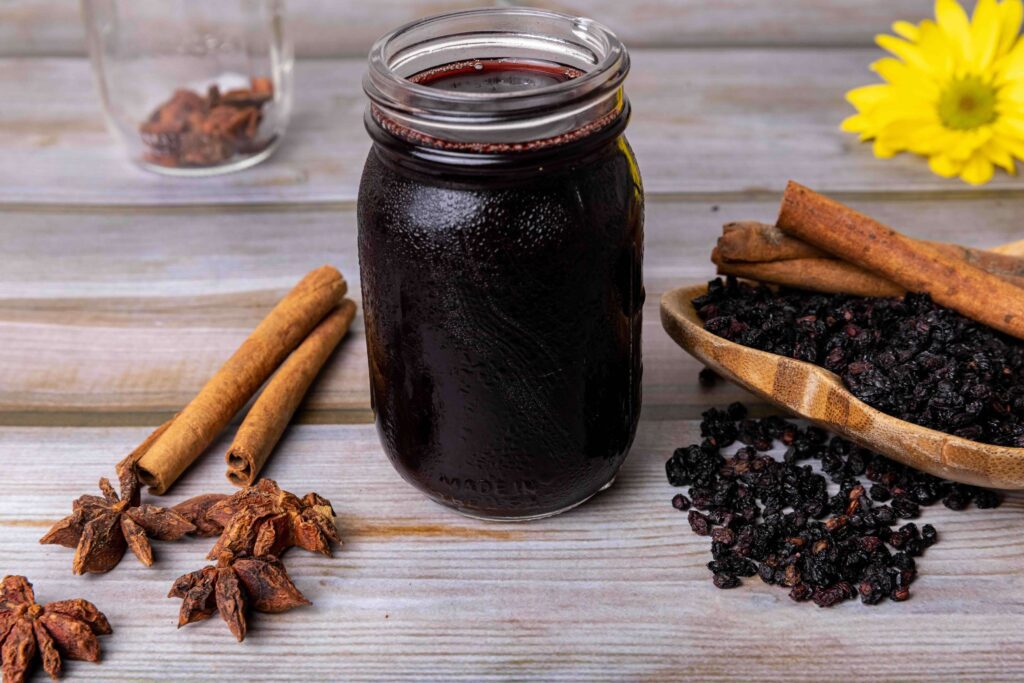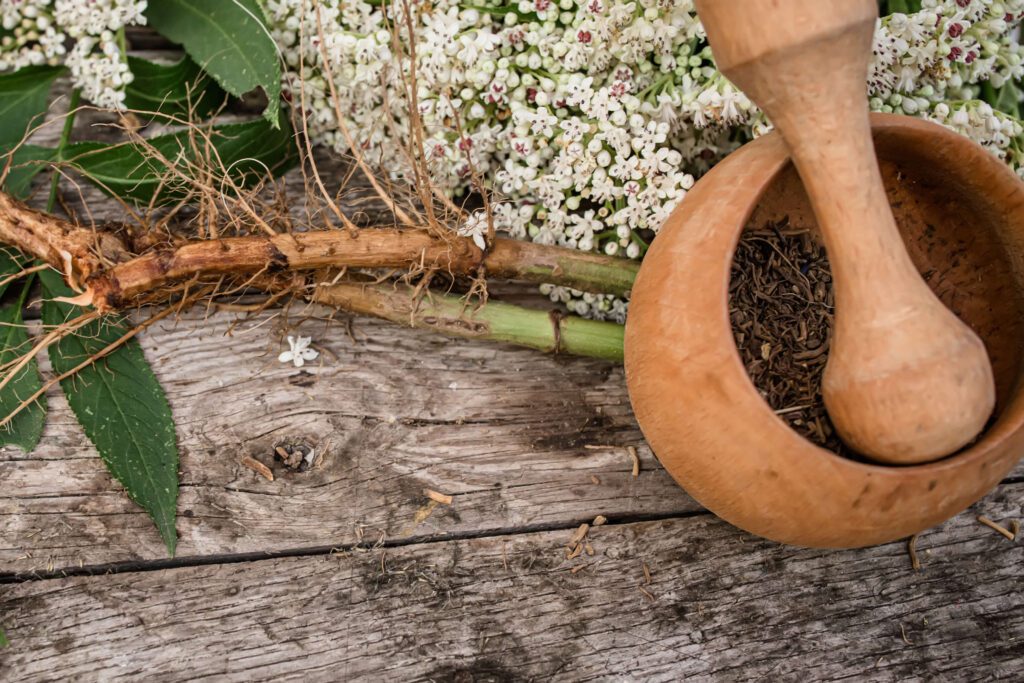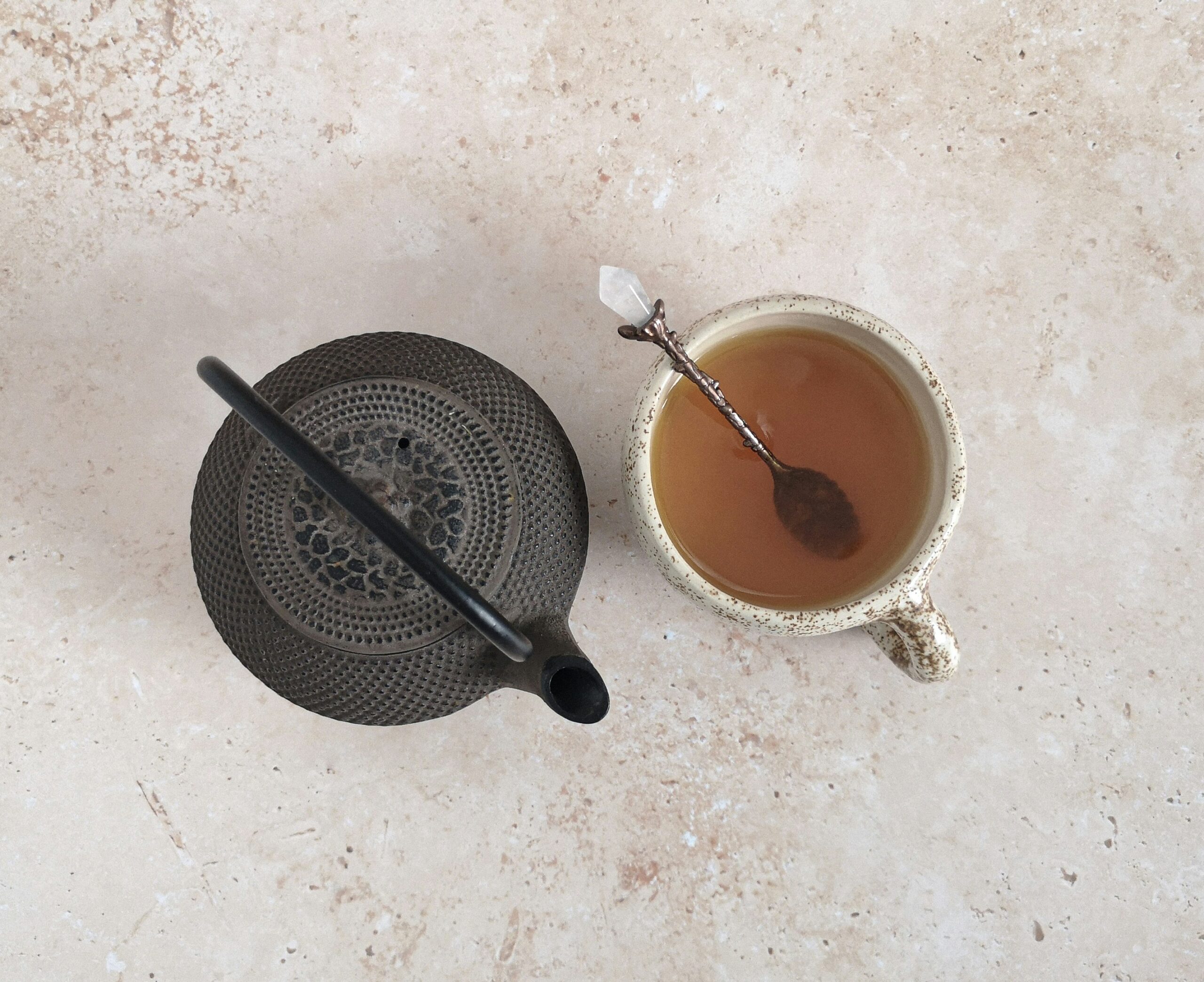
Elderberry (or Sambucus as its scientifically known), is a plant steeped in history and tradition and has been a staple in herbal medicine for centuries known for its clusters of dark purple berries and flowers.
Throughout the ages, elderberry has been commonly known for its potential to support health, particularly when it comes to the immune system. It’s not just folklore; modern research is beginning to uncover evidence that supports some of the traditional uses of this berry – which is exciting!
Incorporating elderberry into your health regimen might seem like a nod to ancient healing wisdom, but it is also backed by contemporary studies exploring its impact on common health concerns.
Whether consumed as a syrup, tea, or supplement, elderberry’s nutritional profile—rich in vitamins and antioxidants—makes it an alluring option especially if you are seeking natural ways to bolster your health.
As with any herbal remedy, understanding the proper use and potential side effects of elderberry is crucial for safe and effective use.
Key Takeaways
- Elderberry has been used in herbal medicine for its health benefits and is under scientific investigation for its immune support potential.
- The Sambucus plant’s berries and flowers are nutritionally rich and commonly used in various forms like syrups or teas.
- Safe consumption of elderberry requires knowledge of its proper use and possible side effects.
RELATED: Elderberry Tea Benefits: How To Boost Your Immune System Naturally
What are we talking today…
- History and background
- Botanical profile
- Nutritional value
- Health benefits
- Elderberry in Herbal Remedies
- Therapeutic Uses and Effectiveness
- Safety and Side Effects
- Guidelines and Recommendations
- Frequently Asked Questions
History and Background
Elderberry, known scientifically as Sambucus nigra, has a storied past intertwining with traditional medicine and cultural beliefs.
Let’s explore its roots and how it’s been classified over time.
Traditional Use in Folk Medicine
Ancient records note that Hippocrates, often called the “Father of Medicine,” utilised elderberry for its health properties.
It’s been a staple in folk medicine across Europe for centuries, touted to treat a wide range of ailments, including colds and flu. In tales and folklore, elderberries were also thought to protect against negative forces.
Elderberry Varieties and Nomenclature
There are several types of elderberry, but the most common one you might hear about is the European elder (Sambucus nigra), which is renowned for its medicinal use.
Meanwhile, the American elder (Sambucus canadensis) also has a presence in traditional remedies, specifically within the indigenous cultures of North America.
The nomenclature “Sambucus” is Latin for elder, but throughout history, these plants have had countless local names and have been classified into various subspecies.
Botanical Profile
Recognising elderberry species and their key characteristics can greatly enhance your understanding of their use in herbal medicine and using it effectively for its properties.

Understanding Sambucus Species
Sambucus, commonly known as elderberry, is a genus that encompasses several species of flowering plants.
The most renowned among them are the European elderberry (Sambucus nigra) and the American Elderberry (Sambucus canadensis), each with its unique botanical attributes.
While Sambucus nigra is famed for its use in traditional remedies, Sambucus canadensis is widely recognized in North America for similar purposes.
You’ll often find elderberries growing in various environments, from well-drained to wetter landscapes, which speaks to their adaptability.
Key Characteristics of Elderberries
Elderberries have distinguishing features that make them stand out:
- FRUIT: Elderberries are known for their clusters of small, dark berries, usually a deep purple to black hue when ripe, and are a marker for identifying black elder. Notably, these berries should be cooked before consumption due to their raw toxicity.
- FLOWERS: The elderflower, or elder flower, is another vital part of the plant. These are typically cream-colored and fragrant, blossoming in large flat-topped clusters known as umbels. Beyond adding a gentle, floral flavor to foods and beverages, these flowers are also harvested for their health-supporting qualities.
By familiarising yourself with these aspects of elderberries, you can appreciate the plants’ full potential in herbal medicine.
Nutritional Value
Elderberry’s accolades in the realm of herbal medicine aren’t solely based on tradition. They come packed with an impressive nutritional profile that supports your overall health. Here’s a breakdown of what you’ll find in these small but mighty fruits.
Macro and Micronutrients
Elderberries provide a range of macro and micronutrients essential to your diet.
While they are low in fat, they offer a healthy dose of protein which is pivotal for muscle repair and immune function.
“Among the mineral content, calcium, potassium, and iron make a significant appearance, contributing to bone health, cardiovascular function, and energy levels, respectively.“
Vitamins and Antioxidants
When it comes to vitamins and antioxidants, elderberries are a powerhouse.
They are particularly rich in vitamin C, an antioxidant that is essential for the growth, development, and repair of all body tissues.
Furthermore, these berries boast a variety of other antioxidants such as anthocyanins, flavonoids, and phenolic acids.
These compounds combat oxidative stress in your body, which can help protect against chronic diseases. Elderberry’s impressive antioxidant capacity is often harnessed in dietary supplements aimed at bolstering immunity.
Health Benefits from Elderberry
Elderberry has garnered a reputation for its potential to support your immune system and reduce certain health risks. Let’s explore these benefits more closely.
Immune System Support
Elderberries are well-known for their role in immune system enhancement.
They contain high levels of vitamins and antioxidants which may help you combat viruses and support overall immune function. Research suggests that elderberry can shorten the duration of colds and flu, helping you recover faster.
Reducing Inflammation and Cholesterol
The anti-inflammatory properties of elderberry can be of great interest to you if you’re looking to reduce inflammation.
Additionally, elderberries have been linked to heart health, as they might assist in managing high cholesterol levels, a common stressor on the cardiovascular system.
“Incorporating elderberry into your diet or as a supplement could contribute to the maintenance of healthy cholesterol levels, promoting overall heart health.“
Elderberry in Herbal Remedies
Elderberry has long been valued in the realm of herbal remedies for its potential in treating and preventing respiratory infections.
Whether you enjoy it in a warm tea or as a sweet syrup, this natural remedy is a staple in many traditional medicine cabinets.
Preparation of Herbal Formulations
“Typically, elderberries are cooked before consumption to ensure safety, as the raw berries, seeds, and leaves contain compounds that can be toxic.”
The cooking process not only neutralises these compounds but also helps to release the beneficial properties of the elderberries.
- Tea: To prepare elderberry tea, steep dried elderberries in boiling water.
- Juice: Elderberry juice is often boiled and then strained to make a pure, concentrated liquid.
- Syrup: For homemade elderberry syrup, simmer the berries with water and sweeteners, and then strain the mixture to create a smooth consistency.
- Jams & Wine: You can also cook elderberries to make jams or ferment them to produce wine.
Remember that consuming elderberries in their raw form is not advisable due to potential toxicity.
Teas, Syrups, and Gummies
Elderberry products come in various forms catering to different preferences and uses:
- Teas: Enjoying a hot cup of elderberry tea could be soothing if you’re feeling under the weather. This herbal brew is simple to make – flavour it with other herbs like echinacea.
- Syrups: Elderberry syrups are convenient and have a pleasant taste, making them a popular choice for daily consumption or at the onset of an infection.
- Gummies: If you’re not fond of teas or syrups, elderberry gummies are a tasty alternative that can be taken on the go.
Each preparation offers a unique way to incorporate elderberry into your self-care routine, whether you prefer the ritual of brewing tea, the quick sweetness of a syrup, or the convenience of a gummy.
Elderberry Therapeutic Uses and Effectiveness
Elderberry has gained popularity for its reported ability to ease symptoms and shorten the duration of common respiratory illnesses. Let’s explore the specific ways elderberry may be beneficial for your health.
Colds, Flu, and Respiratory Health
Elderberry is often touted for its potential to combat flu symptoms and colds.
A study found that air-travellers supplementing with elderberry experienced a reduction in cold duration and symptoms.
Another piece of research suggests that elderberry may offer an improvement in treating respiratory symptoms, crediting flavonoids in the fruit for their antiviral properties that could inhibit the influenza virus’s entry and replication in the human body.
“Moreover, elderberry is thought to have an immunoprotective effect which could aid your immune system in warding off these viruses.“
At a Glance: Elderberry for Respiratory Illnesses:
- May reduce the duration and severity of cold symptoms
- Contains antiviral agents effective against the influenza virus
- Supports immune system function
Other Potential Therapeutic Effects
Beyond respiratory health, elderberry might be able to provide you with other therapeutic effects.
This is because it is rich in antioxidants, elderberry is believed to have a role in neutralising harmful free radicals and exhibiting anti-inflammatory properties.
Such effects could potentially extend to other areas of your health, contributing to overall nutrition and disease prevention.
Research documents elderberry’s medicinal background, but it’s crucial to consult healthcare professionals before using it as a treatment, as data are still emerging regarding its efficacy and optimal use.
At a Glance: Additional Effects of Elderberry:
- Antioxidant properties may support overall health
- Could possess anti-inflammatory benefits
- Emerging evidence backing diverse medicinal uses

Elderberry Safety and Side Effects
Before considering elderberry as an herbal remedy, it’s important to be aware of its potential safety concerns and side effects.
You should consider any risks and how it might interact with other medications or conditions, especially if you fall within certain specific populations.
Potential Risks and Interactions
Elderberry is generally well-tolerated when consumed in moderation and as part of a diversified diet.
However, raw elderberry fruit, leaves, seeds, and stems contain cyanogenic glycosides, which can release cyanide, a potentially toxic substance. It is crucial to ensure elderberry supplements and syrups are properly prepared, as improper preparation could lead to adverse effects such as vomiting, nausea, or diarrhea.
When it comes to drug interactions, elderberry may influence the immune system, which could interfere with medications that suppress the immune system.
If you are taking such medications, it would be prudent to consult with healthcare providers before starting any elderberry products. Additionally, given that elderberry can have an effect on blood sugar levels, if you have diabetes, you should monitor your blood sugar closely.
Specific Populations and Precautions
For pregnant and breastfeeding individuals, there’s limited research on the safety of elderberry use, so it’s a good practice to stay on the side of caution and avoid the use of elderberry without medical advice.
As for children, they are more vulnerable to the effects of toxic substances; thus, attention to proper dosages and preparation is critical.
If you experience symptoms like dizziness or more severe gastrointestinal issues, it’s essential to discontinue use and seek medical attention.
Long term use of elderberry supplements hasn’t really been studied extensively so always best that you follow product instructions!
Remember, it’s always best to consult with a healthcare provider before starting any new supplement, especially if you belong to any of the specific populations mentioned above, to ensure your safety and well-being.
Guidelines and Recommendations
In this section, you’ll find important information on how to properly use elderberry products and the significant regulations that ensure their quality and safety.
Proper Dosage and Administration
Finding the correct dosage of elderberry is crucial for its effectiveness in managing symptoms of viral respiratory infections.
Although there’s no universally agreed-upon dosage, studies suggest that certain amounts can be beneficial.
For instance, an elderberry supplement study reflects that supplements were taken within 48 hours of the onset of symptoms. The key is to follow the manufacturer’s guidelines and consult healthcare providers, especially if you’re also taking other medications, to avoid potential drug interactions.
Suggested dosage for adults:
- Daily prevention: Typically 10–15 ml of elderberry syrup
- Acute treatment: Up to 60 ml of elderberry syrup, spread out in small doses throughout the day
Please keep in mind that these dosages are examples and can vary by product.
Regulatory Aspects and Quality Control
The FDA does not approve dietary supplements in the same way as conventional medications.
Therefore, it’s important to purchase elderberry products from reputable sources that adhere to good manufacturing practices. Look for products that have undergone a systematic review or meta-analysis, which adds a layer of credibility to their claimed benefits.
Guidelines for product quality include:
- Verified by third-party testing
- Clear label of ingredients and dosages
- Compliance with the standards for dietary supplements
Remember, you should always inform your healthcare provider of all supplements you take to ensure a proper understanding of all possible interactions with your current treatment regimen.
Frequently Asked Questions
Elderberry supplements have become increasingly recognized for their potential health benefits. Here, we’ll answer some common questions to help you understand how they might fit into your wellness routine.
What health benefits can women expect from using elderberry supplements?
Women may experience immune support and a potential reduction in the duration of colds with elderberry supplementation, especially useful for those who frequently travel or have high exposure to germs.
Can elderberry supplements improve skin health, and if so, how?
Elderberry’s high antioxidant content may help protect the skin from damage due to UV rays and aging, promoting a healthier and potentially more youthful complexion.
Are there any particular groups of people who should avoid taking elderberry?
Individuals taking diuretics or immune-suppressing medications, those with autoimmune diseases, or pregnant and breastfeeding women should consult with a healthcare provider before incorporating elderberry into their regimen.
What are the potential side effects of consuming elderberry products?
Unripe or improperly prepared elderberries can cause nausea, vomiting, or diarrhea due to toxic compounds; stick with commercial elderberry preparations to avoid these effects.
In what ways can elderberry syrup be beneficial to one’s health?
Elderberry syrup, due to its antiviral properties, may reduce cold severity and duration, and support the immune system in combating respiratory infections.
How is elderberry commonly used in herbal medicine practices?
Herbalists often use elderberry as part of a holistic approach to treat colds, flus, and other respiratory ailments, valuing its immune-boosting and antiviral qualities.



Comments +